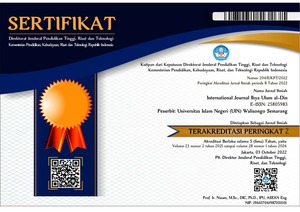Hermeneutical Approach For Qur’ânic Exegesis: An Offer From The West
DOI:
https://doi.org/10.21580/ihya.16.2.1650Keywords:
Hermeneutics, Qur’ânic Exegesis, the WestAbstract
This article will present the general description of hermeneutical approach, including historical background and phenomenon in understanding the text as well as the Qur’ân. This article will try to portray hermeneutical approach in interpreting Qur’ân which has been discussed by many scholars. It found that hermeneutical approach is an alternative method to understand Qur’ân or even Hadis. It may give a new spirit in developing Qur’ân in terms of its long-lasting values. Many modern scholars have undoubtedly struggled to show that Qur’ân will be more ‘up-to date’ and compatible with the current issues in modern life if we are open to new approach to it. However, not all scholars agree with this method since they believe that Qur’ân is a sacred book which cannot be approached by whatever Western methods, especially hermeneutics. Even, they condemn that the people apply such a method can be categorized as infidel.
---
Artikel ini akan menyajikan gambaran umum tentang pendekatan hermeneutis, termasuk latar belakang dan fenomena sejarah dalam memahami teks dan juga al-Qur'an. Artikel ini akan mencoba menggambarkan pendekatan hermeneutis dalam menafsirkan al-Qur'an yang telah dibahas oleh banyak ilmuwan. Hasil penelitian menunjukkan bahwa pendekatan hermeneutis adalah metode alternatif untuk memahami Al-Qur'an atau bahkan Hadis. Hal ini memberi semangat baru dalam mengembangkan Alquran dalam nilai-nilai yang bertahan lama. Banyak ilmuwan modern berjuang untuk menunjukkan bahwa Alquran akan lebih 'up to date' dan sesuai dengan isu terkini dalam kehidupan modern jika kita terbuka terhadap pendekatan baru terhadapnya. Namun, tidak semua ilmuwan setuju dengan metode ini karena mereka percaya bahwa Alquran adalah kitab suci yang tidak dapat didekati dengan metode Barat manapun, terutama hermeneutika. Bahkan, mereka menyatakan bahwa orang menerapkan metode semacam itu bisa dikategorikan sebagai orang kafir.
Downloads
References
Arkoun, Muhammed, 1996, Rethinking Islam, Yogyakarta: Pustaka Pelajar
Esack, Farid, 1997, Qur’ân, Liberation & Pluralism, An Islamic Perspective of Interreligious Solidarity against Oppression, Oxford: Oneword
Faiz, Fakhruddin, 2003, Hermeneutika Qur’âni, antara teks, Konteks, dan Kontekstualisasi, Yogyakarta: Qalam
Hidayat, Komaruddin, 1996, Memahami Bahasa Agama, Sebuah kajian Hermeneutik, Jakarta: Paramadina
Ikhwan, Moch. Nur, 2003, Meretas Kesarjanaan Kritis Qur’ân, Teori Hermeneutika Nasr Abu Zaid, Bandung: Teraju
Jr., E.D., Hirsch, 1978, Validity in Interpretation, London: Yale University Press
Poespoprodjo, 1987, Interpretasi, Beberapa Catatan Pendekatan Filsafatinya, Bandung: Remaja Karya
Howard, Roy J., 2000, Pengantar Teori-teori Pemahaman Kontemporer, Hermeneutika, Wacana Analitik, Psikososial, dan Ontologis, Bandung: Nuansa
Jurnal Teks, Vol. 1, No. 1, Maret 2002, Pasca IAIN Sunan Gunung Djati Bandung.
Jurnal Hermeneia, Vol. 1, No. 1, Januari-Juni 2002, Pasca IAIN Sunan Kalijaga Yogyakarta
Latief, Herman, 2003, Nasr Hamid Abu Zaid, Kritik Teks Keagamaan, Yogyakarta: eLSAQ Press
Mustaqim, Ahmad, 2003, Madzahibut Tafsir, Peta Metodologi Penafsiran Qur’ân Metode Klasik Hingga Kontemporer, Yogyakarta: Nun Pustaka
Rahman, Yusuf, 2001, The hermeneutical Theory of Nas Hamid Abu Zaid: An Analytical Study of His Method of Interpreting the Qur’ân, Montreal: McGill University
-----------, ‘Kajian Hermeneutik Pluralitas Tafsir Quran’, Jawa Pos, Sunday, 13 January 2002
-----------, ‘Sakralitas Teks-teks Agama’, Kompas, Friday, 18 January 2002
Saenong, Ilham S., 2002, Hermeneutika Pembebasan, Bandung: Teraju
Sumaryono, E., 1999, Hermeneutik, Sebuah Metode Filsafat, Yogyakarta: Kanisius
Syahrur, Muhammad, 1990, Al-Kitab wa Qur’ân Qiraah Mu’ashirah, Damaskus: Al-Ahali
Thomson, John B., 1990, Paul Ricoeur Hermeneutics & The Human Sciences, Cambridge: Cambridge University Press
Downloads
Published
How to Cite
Issue
Section
License
By submitting an article to the journal, the author(s) agree to transfer the published article's copyright to the journal, which will act as the publisher. This means the journal will have the right to publish the article in various forms, including reprints. The journal will maintain the publishing rights to the published articles.
This work is licensed under Creative Commons Attribution-ShareAlike 4.0 International License.
In line with the license, authors and third parties (readers, researchers, and others) are allowed to share and adapt the material. In addition, the material must be given appropriate credit, provided with a link to the license, and indicated if changes were made. If authors remix, transform or build upon the material, authors must distribute their contributions under the same license as the original.



